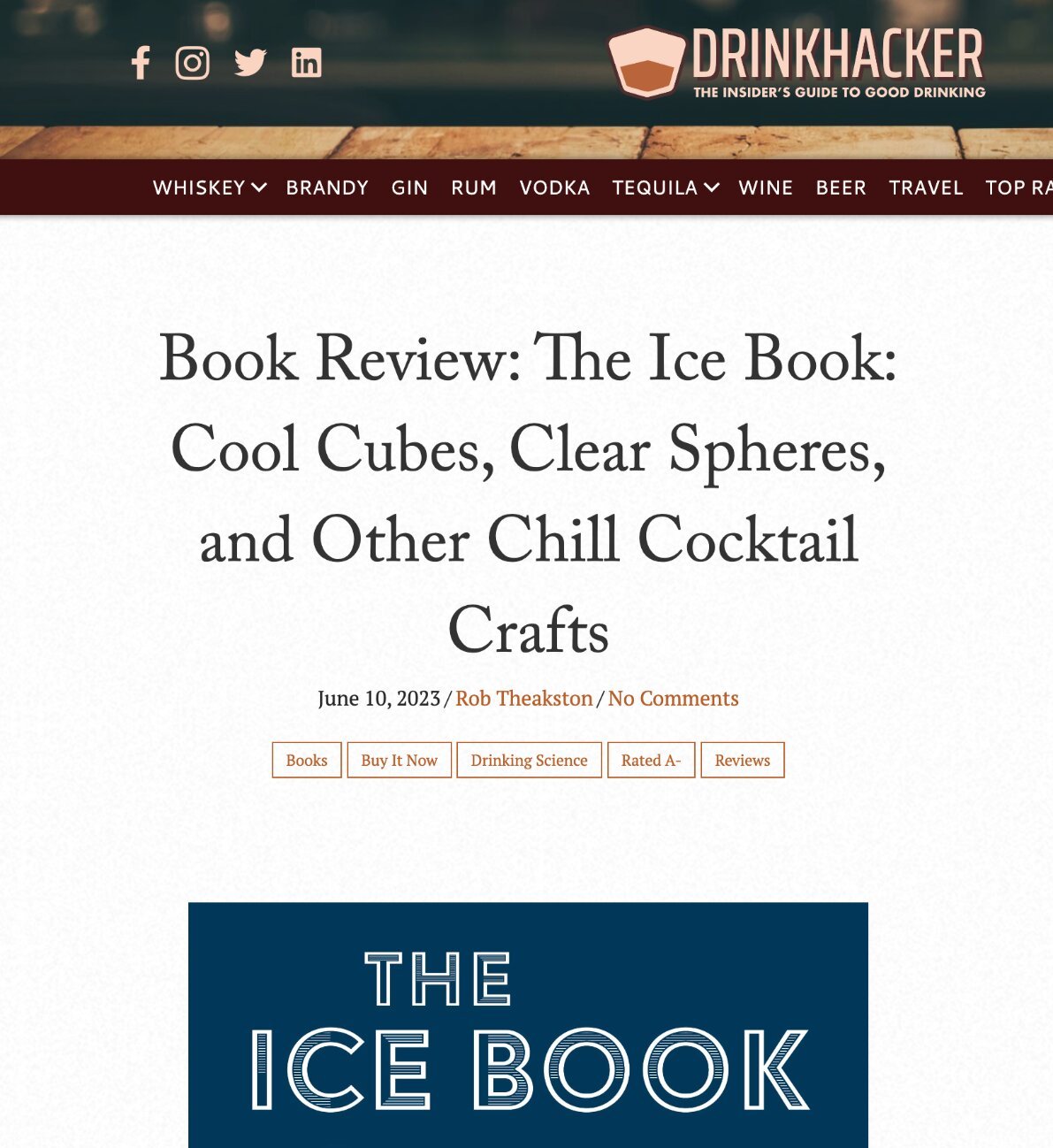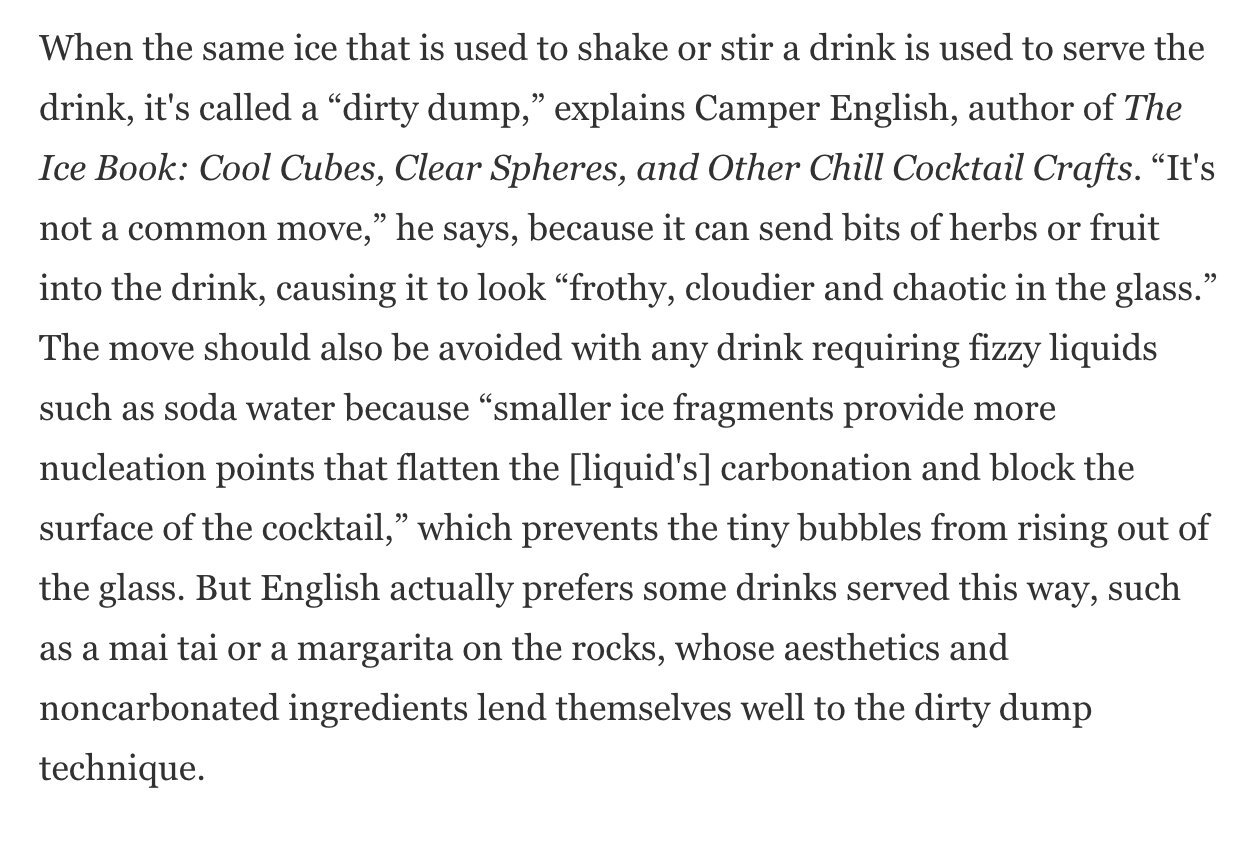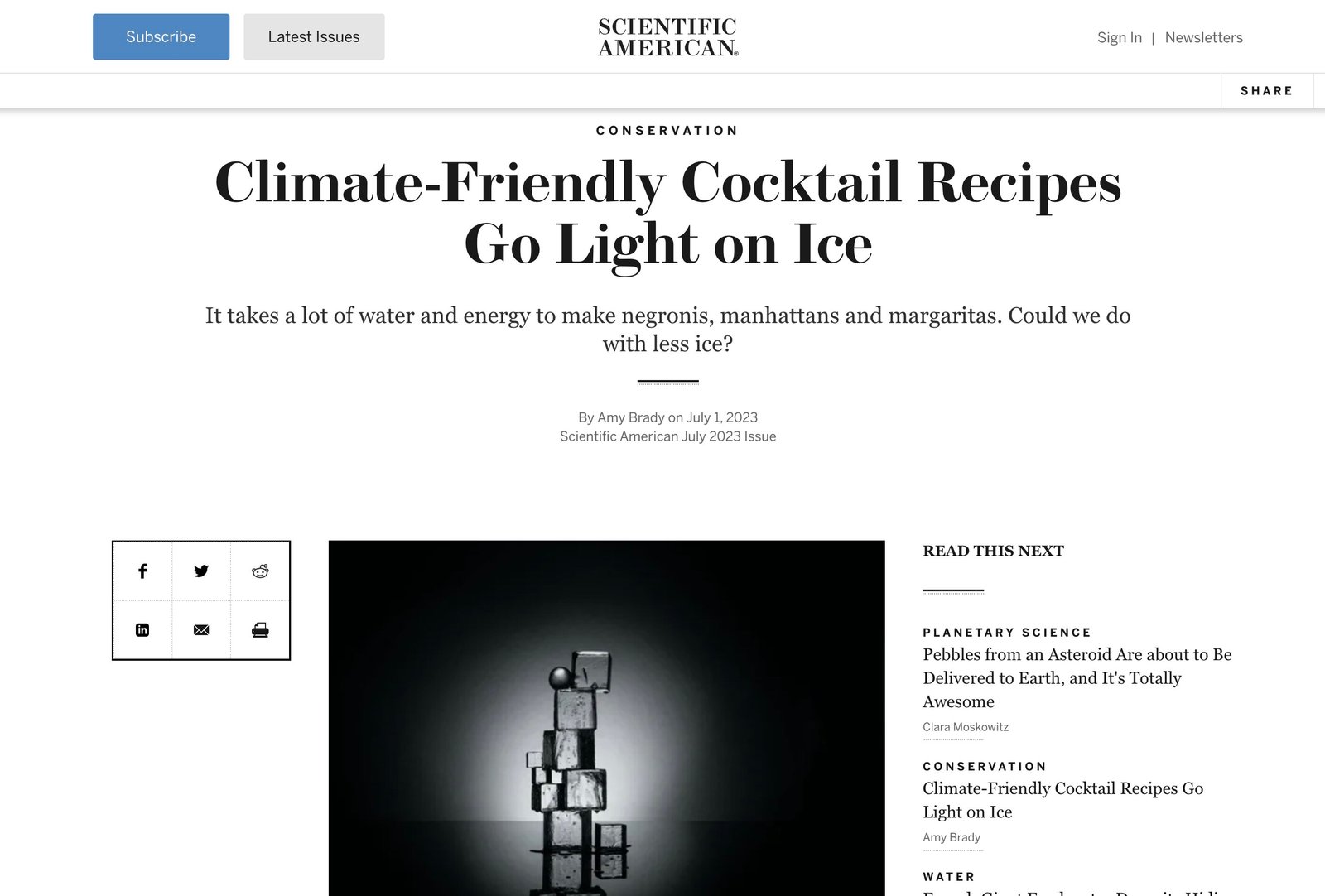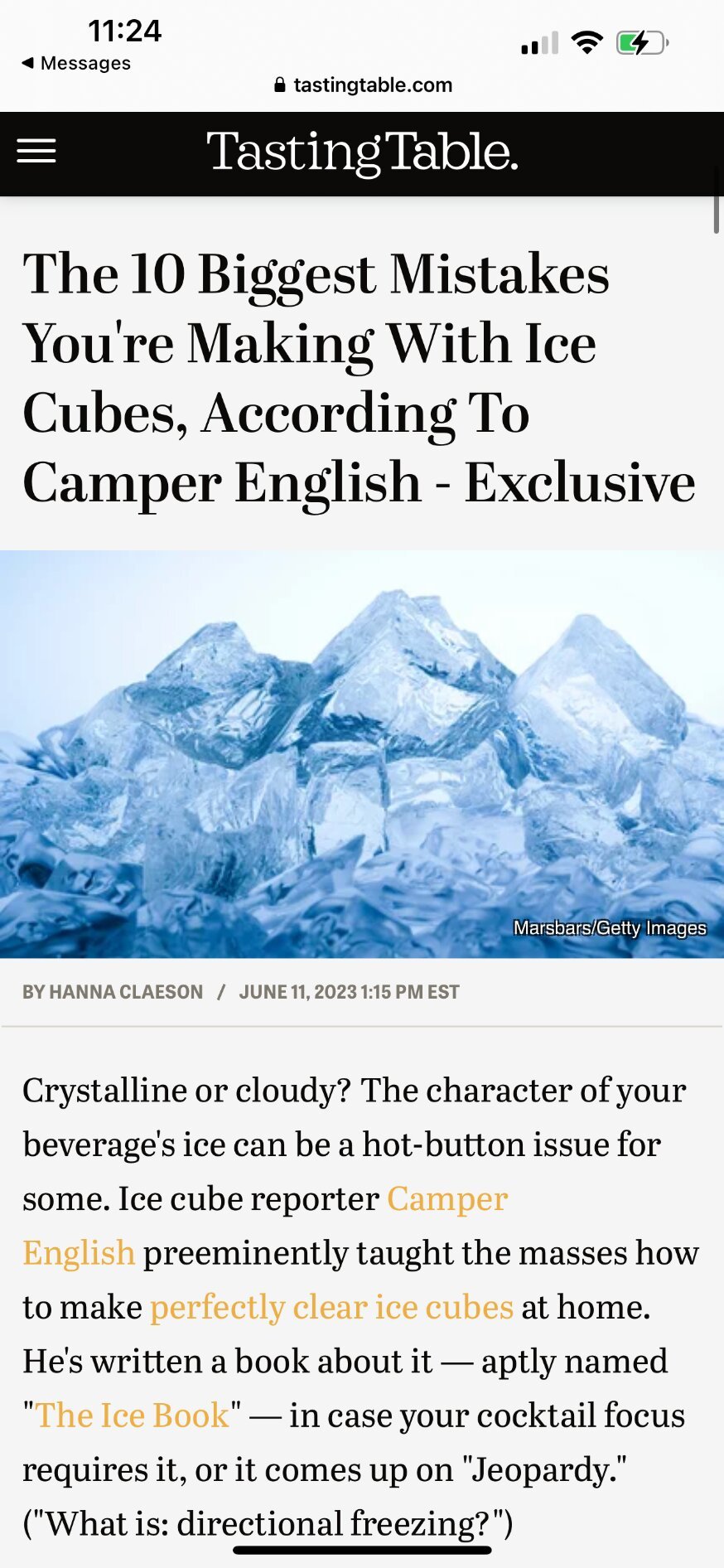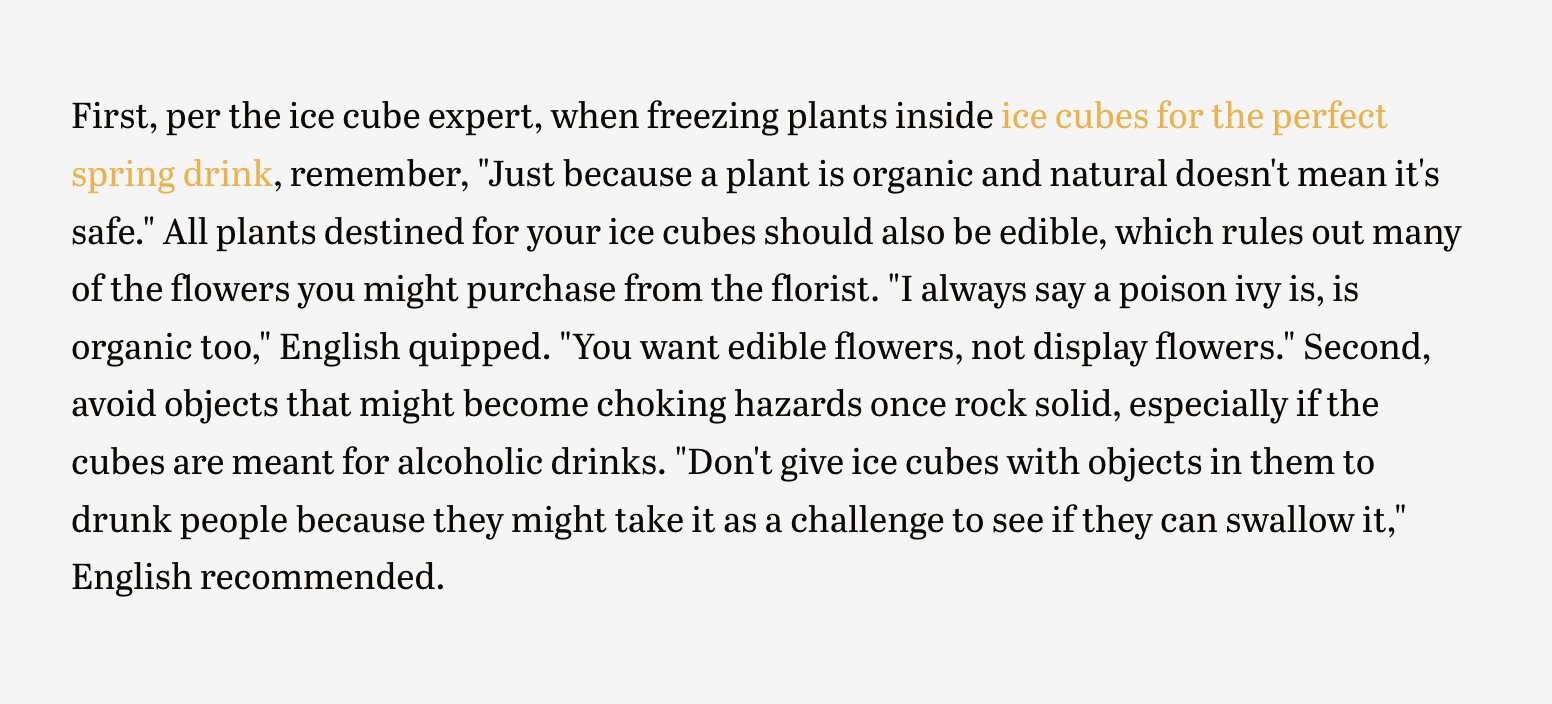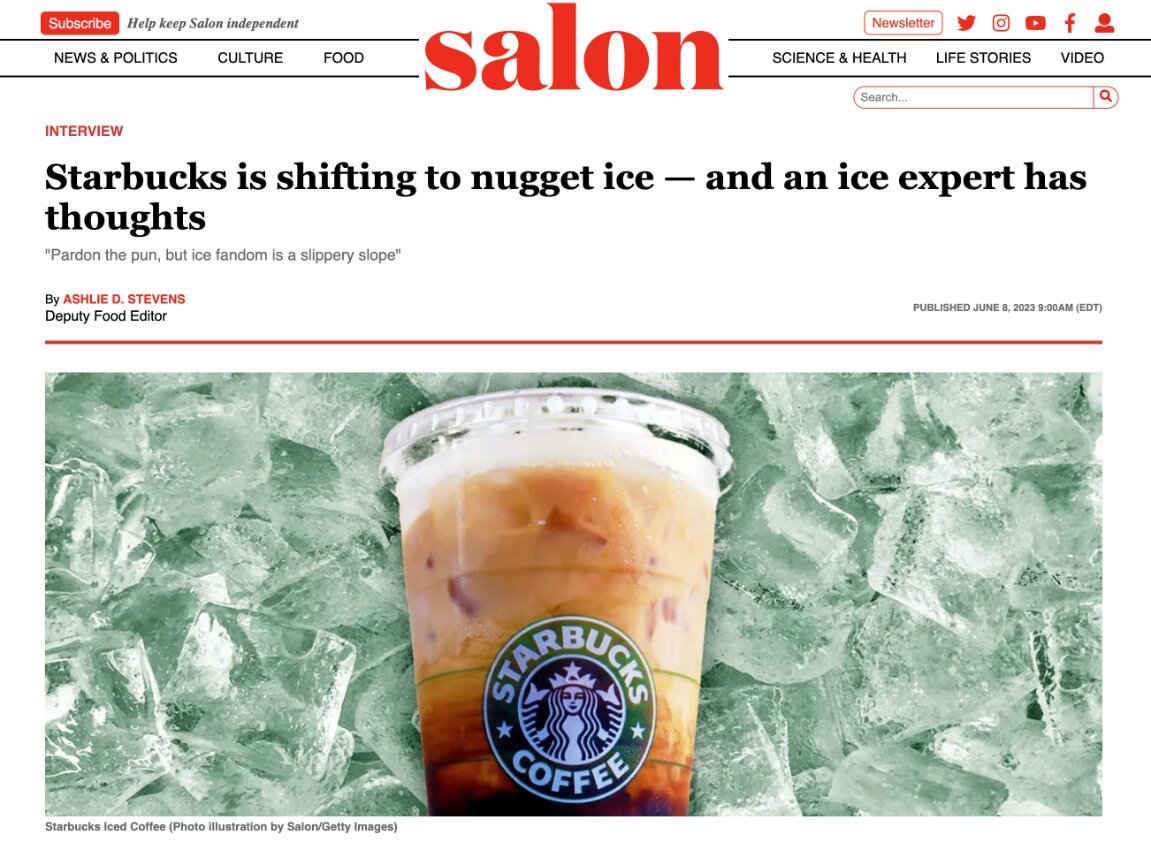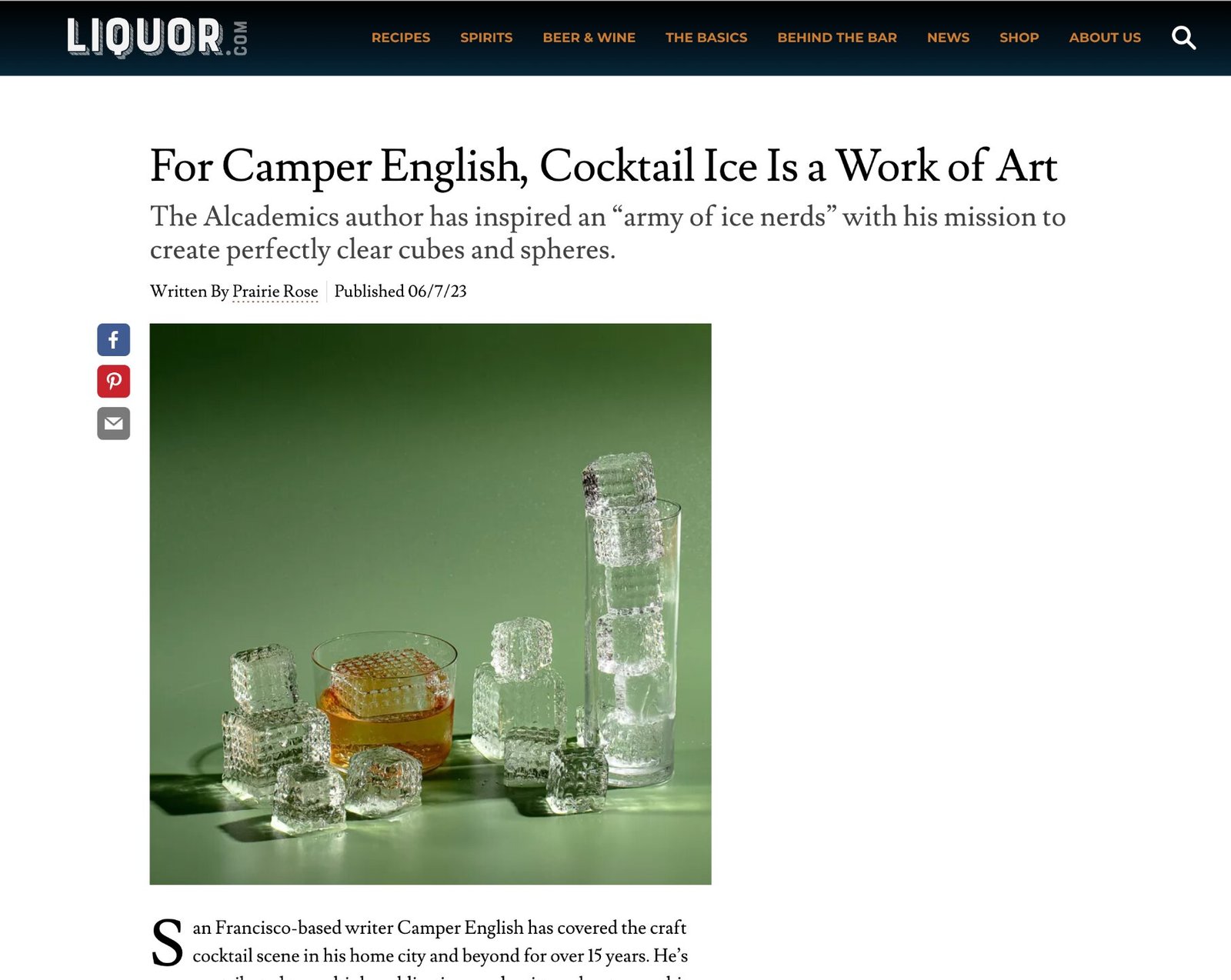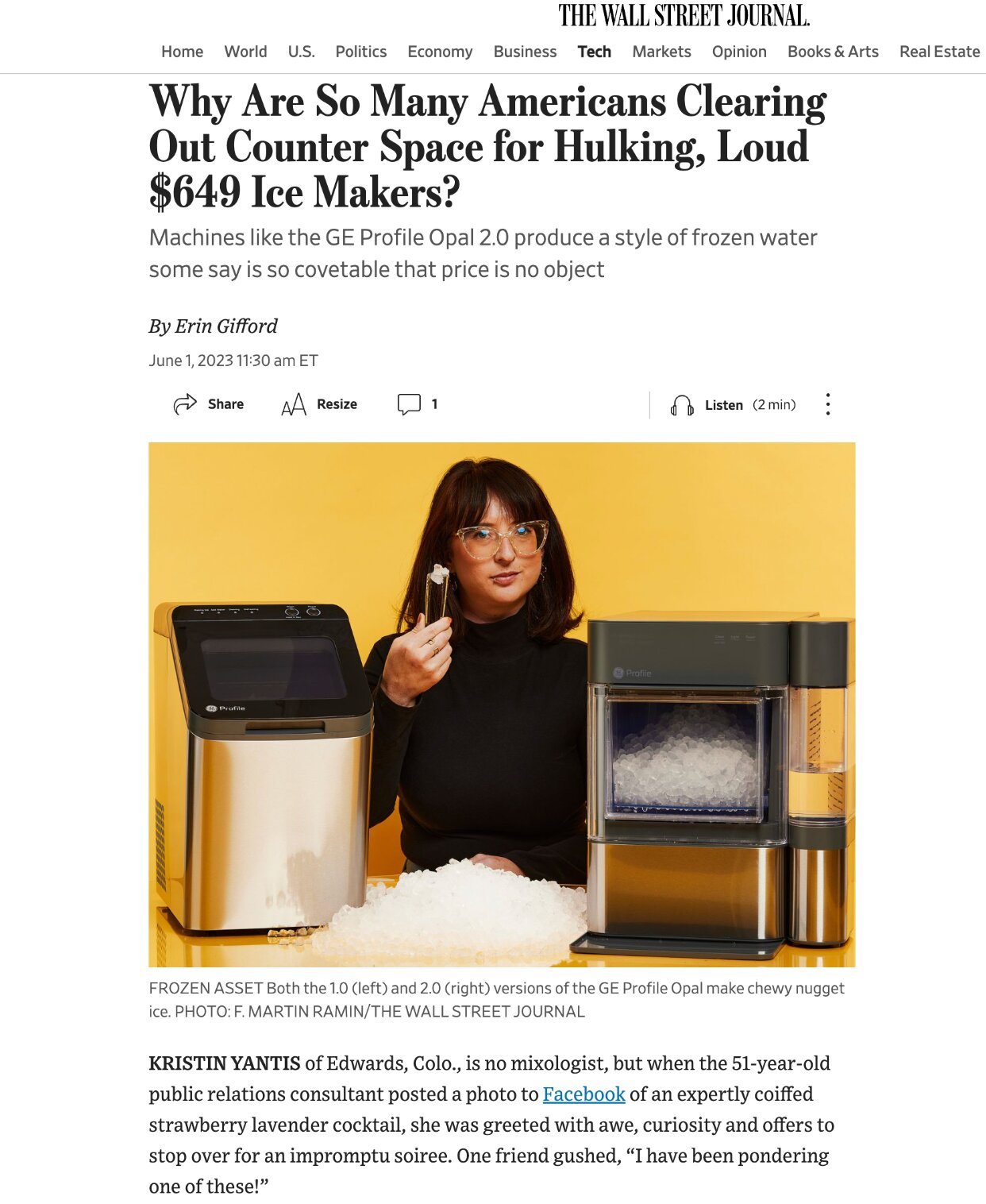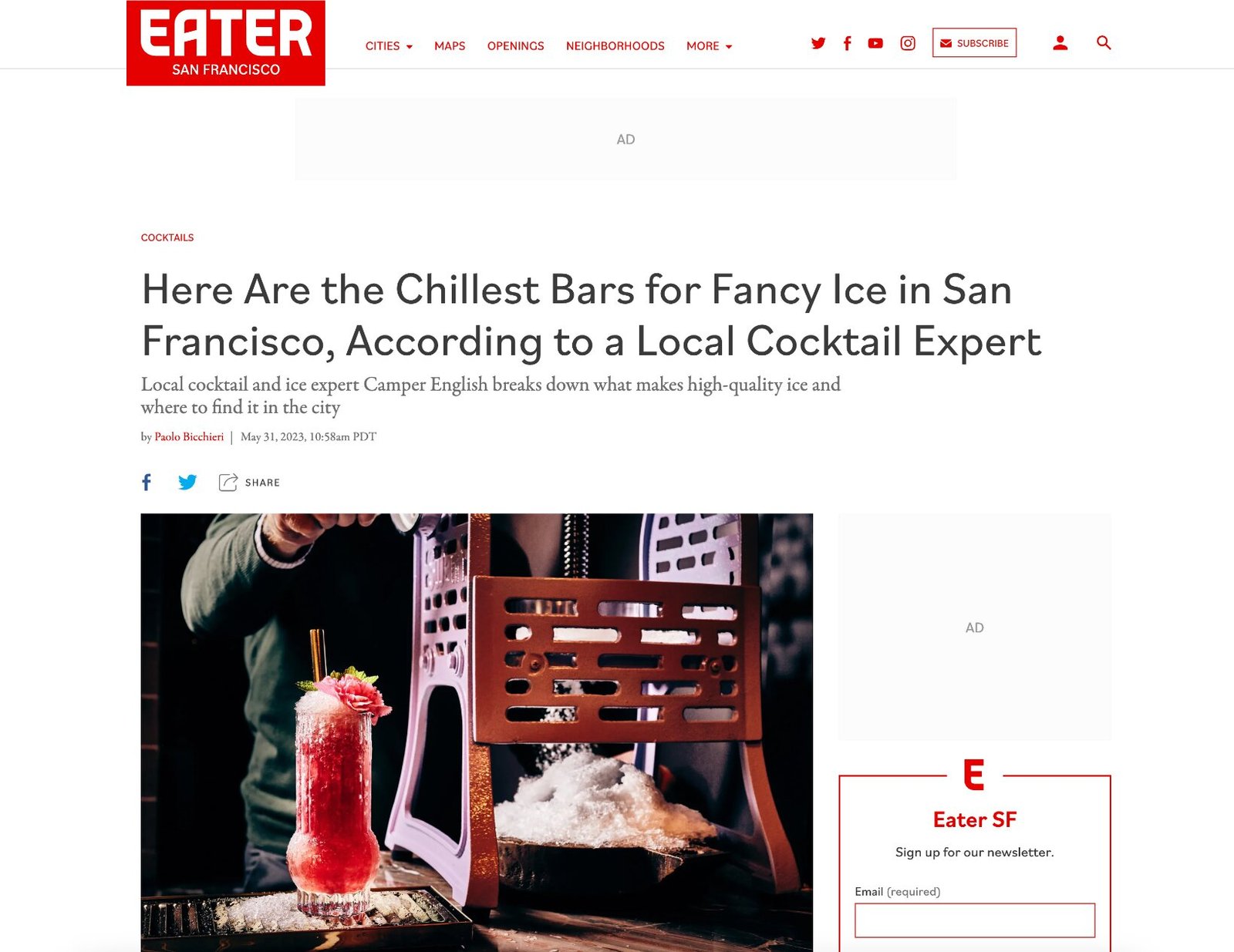For this article on Bevvy.co, I interviewed several experts in cutting ice. One of them, Iruma Shibuya, wrote such an epic response that I wanted to post more of it once the article published. So here it is, lightly edited.
Shibuya talks about the types of tools he has used in Japan and makes some recommendations as to the simplest/easiest way to work with and without them.
My name is Iruma Shibuya and I have had the pleasure of working in the industry for the last 8 years. I can be found working at Backbar in Somerville MA, or working catering and educational events for The Cocktail Guru. I was presented with an opportunity to intern at the world acclaimed BAR HIGH FIVE early on in my career, and had the pleasure of interning there for a combined total of 2.5 months between 2016, and 2017.
During my time, I delved into the details and care of hospitality, networking, bar techniques, and most notable for what you are looking for, ice cutting by hand. This experience has lead to me seeking out tools for ice cutting in Tokyo, Osaka, and in my local Boston area. I haven’t had luck in terms of tools that are actually made for ice cutting in Boston, but I have found tools that can achieve the end results with practice and patience.
Clear ice in Japan is purchasable at bars, and the one I worked with was a rectangular block of ice, roughly 30lb that already had a slit cut down the middle, and was already at the perfect thickness for our glassware. Each half would be cut into 15 cubes after a temping period, shaped, and put into rotation once it was fully refrozen.
 The main 2 blades we used were the soba noodle knife to do the breakdown cuts, and a chicken boning knife for shaping. During my time in Tokyo, I was introduced to the food and beverage focused shopping district of Tokyo known as かっぱ橋道具街 (Kappabashi Tool Street) by Hidetsugu Ueno-san, Owner of BAR HIGH FIVE. The Soba Knife we used is made of stainless steel instead of iron, and it was not the most expensive or impressive blade. The focus was to find a single sided blade with a straight edge that wasn’t too thick and could weather being wet without rusting. Soba knives essentially worked as a long wedge, and if not careful, a thicker blade has the potential to create bigger initial cracks and loss on edges/corners if careless.
The main 2 blades we used were the soba noodle knife to do the breakdown cuts, and a chicken boning knife for shaping. During my time in Tokyo, I was introduced to the food and beverage focused shopping district of Tokyo known as かっぱ橋道具街 (Kappabashi Tool Street) by Hidetsugu Ueno-san, Owner of BAR HIGH FIVE. The Soba Knife we used is made of stainless steel instead of iron, and it was not the most expensive or impressive blade. The focus was to find a single sided blade with a straight edge that wasn’t too thick and could weather being wet without rusting. Soba knives essentially worked as a long wedge, and if not careful, a thicker blade has the potential to create bigger initial cracks and loss on edges/corners if careless.
The next tool we used to clean up the edges of the cubes we made is a chicken boning knife. For shaping, this boning knife is very helpful because the blade was made to deal with hard materials, unlike the soba knife. Some people I interned with had difficulties using this knife because their hands were a bit bigger than their asian counterparts, but with proper angles, techniques and lots of patience and practice, it didn’t seem to be an issue. The chicken boning knife is also a single sided blade and that helps maintain a clean cut.
In Boston, I used to work with 50lb blocks that were cut from big 300lb Clinebell made ice. These blocks were intimidating to cut in comparison to the perfectly prepped clear ice that was available in Tokyo, so when I was in Osaka where my family resides, I went to another shopping district geared towards restauranteurs called Sennichimae-Doguyasuji. I have purchased a total of 7 ice saws from Sakai Ichimonji Mitsuhide, and I may have gone through their entire stock of larger ice saws. When I was visiting in January, 2020, they no longer had larger saws, but was able to make saws via custom orders with a 2 month wait time. These ice saws are made to have the tips of each tooth to slightly flare outwards so that as one cuts ice, the ice chips and water gets pulled out of the channel rather than getting caught in the block. This helps speed up the cutting process, and there is less opportunities for the ice chips and water to gunk up and refreeze in the channel around the saw while one cuts ice.
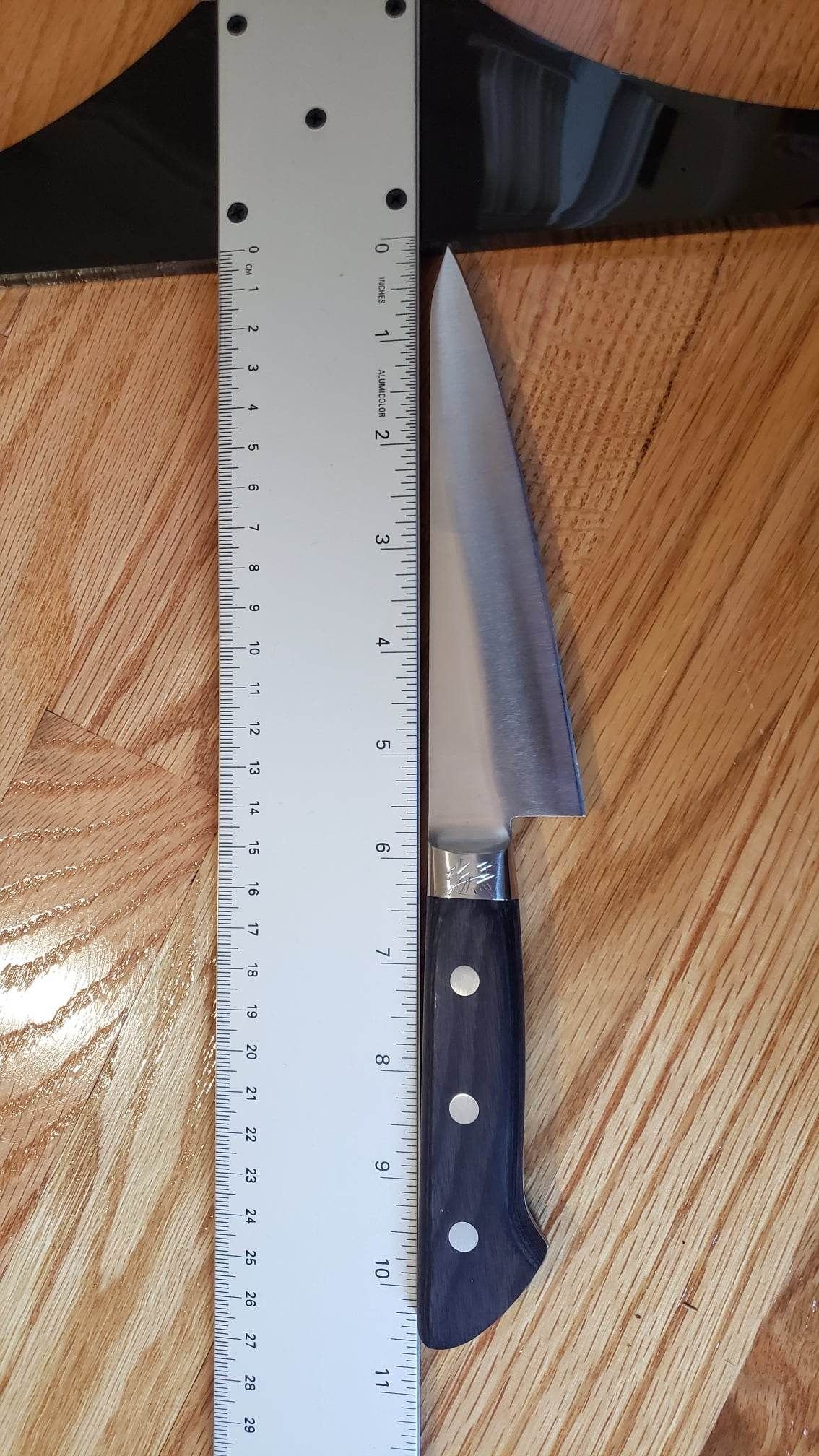 I own two ice saws, the short one is meant for easy transport, and the longer one has enough length to fit two blocks under it. The ice saws are made to have a consistent thickness through the length of the blade, but right as you get to the handle the metal gets thicker. When cutting ice, one needs to keep the ice where the blades are, or risks breaking the block in unwanted ways if the wide handle accidentally wedges apart the blocks prematurely. The longer saw is my preference, as there is more travel distance available for quickly slicing through the blocks.
I own two ice saws, the short one is meant for easy transport, and the longer one has enough length to fit two blocks under it. The ice saws are made to have a consistent thickness through the length of the blade, but right as you get to the handle the metal gets thicker. When cutting ice, one needs to keep the ice where the blades are, or risks breaking the block in unwanted ways if the wide handle accidentally wedges apart the blocks prematurely. The longer saw is my preference, as there is more travel distance available for quickly slicing through the blocks.
Here is the method I have found to be the easiest way for cutting a 50lb block with time, loss and melting in mind. I take a 50lb block of ice (1/6th of a 300lb block of clinebell ice), and saw out 4 equally sized slabs. I then cut each slab into 4×4 cubes using the soba knife and a mallet, and once all the slabs were cut down to cubes, shape it with the chicken boning knife. After an hour of temping the block of ice to prevent cracks while handling, a standard amount of time I have come to achieve is 30-40 minutes to cut 64 cubes, and an additional 20-30 minutes to shape them after.
While at BAR HIGH FIVE, I was taught that the soba knife doesn’t have to be extremely sharp, on the contrary if it’s too sharp it can lead to chipping the blade on the ice. The most important part of using the soba knife is that you have a wide & consistently straight edge that touches the entire surface of the ice you are trying to cut. When cutting the ice slabs, I am using a wooden mallet to tap on the soba knife to send directional vibrations to cut ice like quarry rocks. I have used rubber mallets with different sizes/weights, plastic, metal, and wooden mallets which I have found the most success with. Metal on metal scares me in terms of damaging my blades, plastic mallets didn’t have enough weight and couldn’t send the vibrations through the blade and ice very well, and rubber mallets are okay depending on which weight you get; I have not worked with a dead-blow mallets, but have found standard 16oz mallets to be the easiest to work with. A simple wooden Cocktail Kingdom mallet however is my preference because it seems to send directional vibration through the blade and into the ice with just the right amount of kinetic energy to cut the ice without creating too much force on the surface, which leads to chipping & breakage.
 I have tried using cleavers, however due to the blade being rounded, it doesn’t provide an even distribution of how the vibrations are sent through the blade or ice, and I have found that it leads to uneven breaks and cracks.
I have tried using cleavers, however due to the blade being rounded, it doesn’t provide an even distribution of how the vibrations are sent through the blade or ice, and I have found that it leads to uneven breaks and cracks.
I have also tried tapping on ice while using the ice saws, but that creates an uneven triangular break due to the jagged and multi pronged edges that are all essentially creating many wedges attacking the ice from many angles, especially with my saws that has the teeth flared outwards.
I have also shaped ice using the soba knives, however I have found that the blade is much softer in comparison to the chicken boning knife and can lead to damaging the straight surface that the soba knife was intentionally sourced for. Sharpening soba knives are considered to be more difficult than regular kitchen blades due to the consistently straight shape it has to maintain, so IMHO I would say in the long run, you would be saving blade’s edge by purchasing an additional knife to shape.
When making ice spheres, I learned to work with a 3 pronged ice pick, then once roughly shaped to use a petty knife to slice away any of the bumpy edges. The petty knife I own is one that Ueno-san of BAR HIGH FIVE had collaborated with Kama Asa, and it is a hardened blade that has been well sharpened but only used for ice.
I personally do not carve ice diamonds because I have not worked at a bar where I would have enough time to make such delicate sculptures for beverages by hand. I find it magical to watch someone like Ueno-san carve a diamond in his hand, but it is much like watching someone make a Ramos Gin Fizz. Just like a Ramos, I’d rather order it at the bar than at a table or booth away from the bar, because you miss the beauty of it being made. Ice diamonds cut to order takes a slight bit of time, and imho lacks purpose when just served without being able to watch the mastery and artistry because the many edges melts faster than a sphere which is comprised of a singular surface.
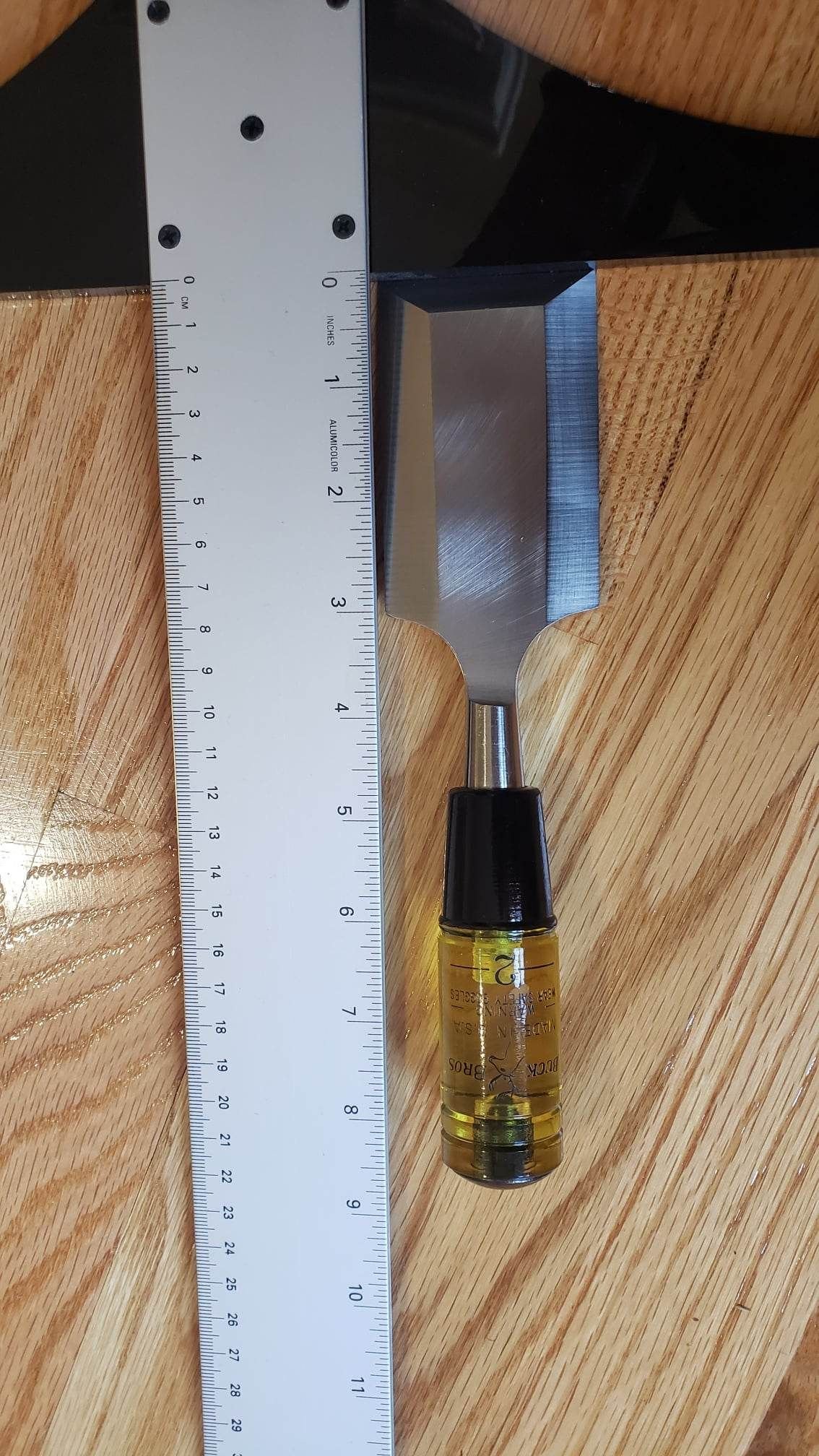 All of these tools I own helps me cut ice in the most optimal fashion, however these tools are difficult to come by or extremely expensive if not purchased in Japan.
All of these tools I own helps me cut ice in the most optimal fashion, however these tools are difficult to come by or extremely expensive if not purchased in Japan.
If I were to suggest people with limited availability in terms of tools and resources, I would suggest a wooden mallet, 2 inch chisel, and to cut the blocks in a primal manner. Primal as in cutting the block in half, then another half, etc etc until the size of cubes desired are obtained. Shaping and cleaning can also be achieved with the chisel, and most of all, the chisel’s blade is single sided, which helps to get clean cuts.
The fastest method of breaking down a block if there is no care for shaping the edges, I would suggest a 3 pronged pick, and to break the block in a primal manner by methodically creating a line of picked points. At the end of day, I have found cutting ice by hand is a delicate balance of practiced & optimal temperatures, angles, force, and an awareness of time.

